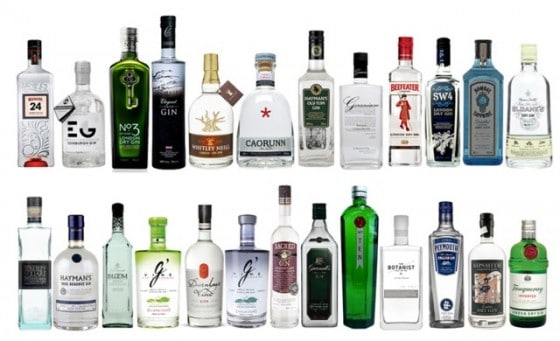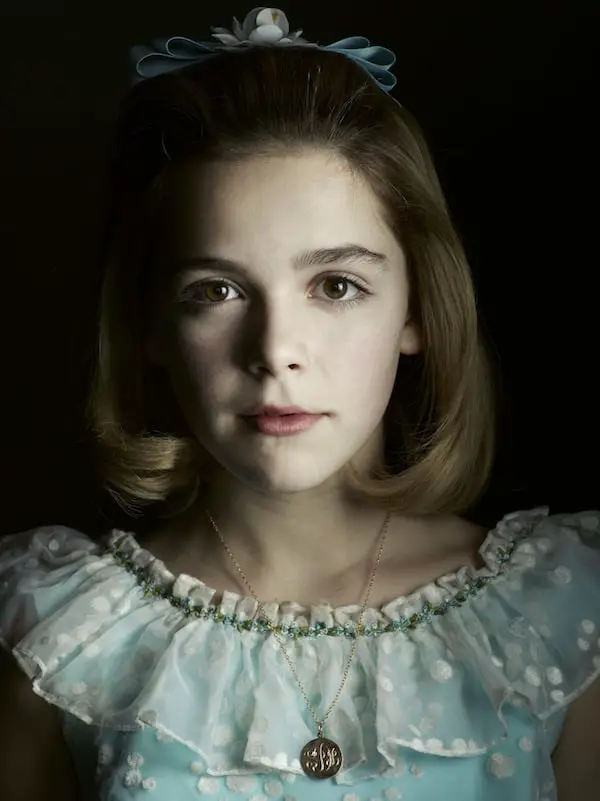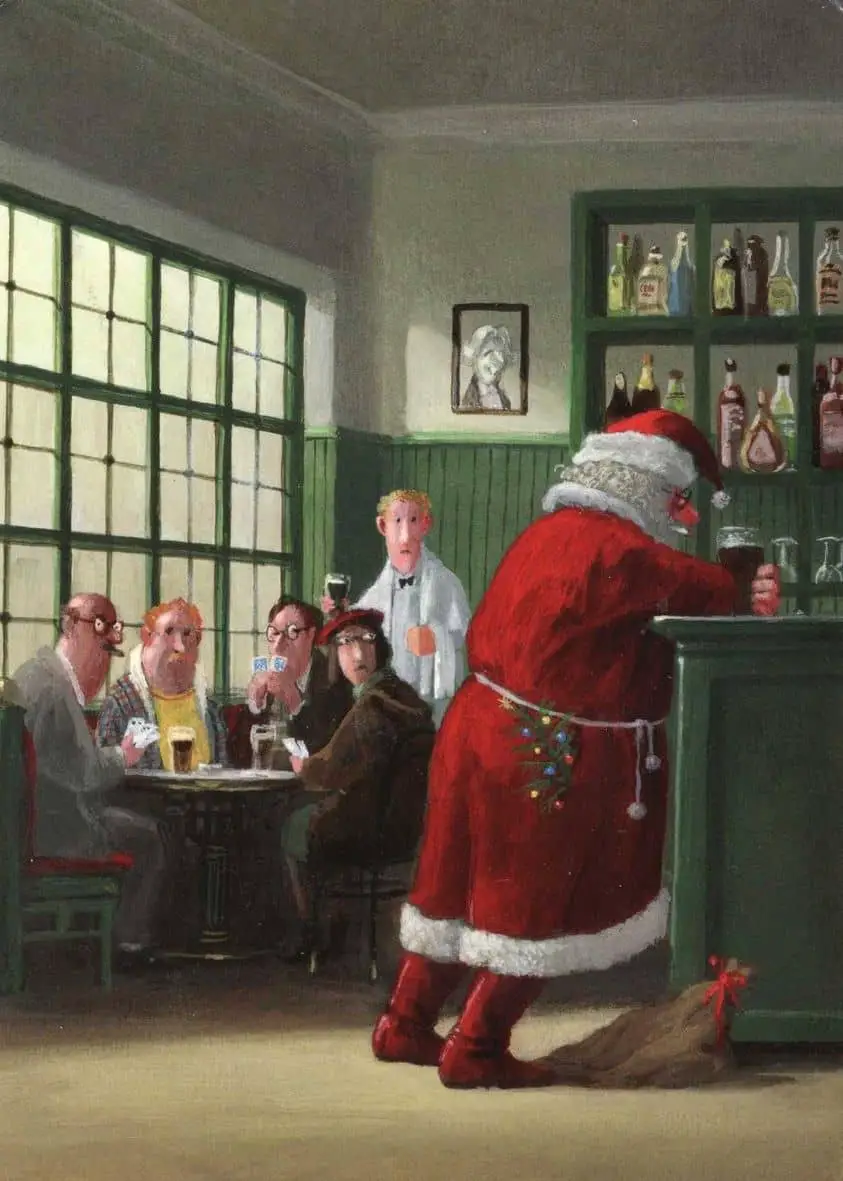It is impossible to read The Sorrows of Gin naively when you know that Cheever himself was plagued by the bottle. This is a short story about how a man’s drinking affects his only daughter. I feel there are enough clues in this story to foreshadow a future of alcohol addiction for the daughter.

This short story is an example of a character change that almost happens — there is every opportunity for it to happen — but the character is too inward looking to have any sort of epiphany, and we are left with the sombre feeling that, from here, things will only get worse. The final sentence is a rhetorical question, and the reader knows the answer to it: Stop drinking! But the main character (the father) doesn’t know it.
WHAT HAPPENS IN THE STORY?
A new cook tells the lonely nine-year-old daughter of a well-to-do couple about her own alcoholic sister, and how just having alcohol in the house proves too much of a temptation. Disquieted by the drunkenness of her own parents, Amy tips a bottle of gin down the drain. (Though she has possibly been doing this for some time, resulting in all sorts of dismissals.) This contributes to the cook’s getting fired. Amy does the same again, getting the next housekeeper fired. Though Amy doesn’t see any causation to her actions, her long-standing non-drinker baby-sitter ends up in an altercation with her father, who accuses her of stealing his gin.
Amy is upset at the altercation between her father and her baby-sitter, hearing the word ‘Police’ shouted from downstairs, so the following day when her parents are out she packs a few things, steals $20 from her mother’s desk and goes to the station where she plans to run away from home.
Mr Flanagan the station master sells her a ticket, but promptly calls her father. The father arrives at the station and is briefly filled with emotion for his daughter, but this feeling quickly fades and we are left feeling that he has missed his chance for character growth, and that things will continue as they have been at home.

SETTING OF THE SORROWS OF GIN
Shady Hill
This is one of Cheever’s Shady Hill stories. Other notable stories set in this place are The Swimmer and of course The Housebreaker of Shady Hill.
[Cheever’s] Shady Hill is a fictional territory to consider alongside Faulkner’s Yoknapatawpha County or Thomas Hardy’s Wessex.
The Guardian
Cheever’s description of the Shady Hill train station creates in the reader an eerie locale, helped along by a reference to the well-known creepy French folktale of Bluebeard, in which a man takes a woman captive in his basement. Though Bluebeard is not a father-daughter story but a story of a husband and his wives, the theme of female captivity is nevertheless replicated in this suburban story.
The railroad station in Shady Hill resembled the railroad stations in old movies [Amy] had seen on television, where detectives and spies, bluebeards and their trusting victims, were met to be driven off to remote country estates.
Milieu
This was an era before the perils of drunk driving were widely known, and the babysitter simply had to put up with drunk men driving her home after her baby-sitting jobs. Moreover, women couldn’t necessarily drive themselves and cars were expensive:
Mrs. Henlein, anxious to get into her own bed and back to sleep, prayed that he wasn’t going to pour himself another drink, as they so often did. She was driven home night after night by drunken gentlemen.
Rosemary brings Amy a present of ‘Japanese Water Flowers’. I believe these were a child’s toy — a flower which opened up when placed in water, but I’m not sure if they were real flowers or made of paper.
As Cheever often does, he provides a soundtrack to this story, which is evocative of the times.
CHARACTERS IN THE SORROWS OF GIN
Amy Lawton
The focalised viewpoint is on Amy, a girl in the fourth grade (so 9 or 10 years of age) who fits the trope of the Lonely Rich Kid. I am reminded of the character Sally Draper from Mad Men.

We quickly get the idea that Amy is separated from her parents, both emotionally and physically:
The living-room door was shut, but through it she could hear the noise of loud talk and laughter. They must have been gossiping or worse, because they all stopped talking when she entered the room.
She has to ask the same question twice before her parents notice she is there:
“Who’s going to take care of me?” Amy asked.
“You always have a good time at the Farquarsons’,” her mother said [to her father].
“Well, let’s leave early,” he said.
“Who’s going to take care of me?” Amy asked.
“Mrs. Henlein,” her mother said.
Even so, Amy is a close observer of her father’s moods:
Amy saw that his tense look had begun to soften. He did not seem so unhappy any more, and as she passed him on her way to the kitchen, he smiled at her tenderly and patted her on the top of the head.
Amy noticed that the transformation that had begun with a softening of his features was even more advanced. At last, he seemed happy. Amy wondered if he was drunk, although his walk was not unsteady…
Amy Lawton is a fairly common character in children’s literature, but in stories written for children, the lonely rich kids with borderline neglectful parents go off and have an adventure with the parents conveniently out of the way. If this were a children’s story, it would have focused on Amy’s packing and departure, and possibly on the things she planned to do in her imagination. But this is a story for adults, so the reader’s attention is turned towards Amy’s father. We stand in judgement of him. It is the father we are left with.
Mr and Mrs Lawton
Amy’s parents fit the trope of Parental Neglect:
Parental Neglect happens when the parents are shown not to pay a lot, if any, attention or care to their children for some reason. Maybe they’re just busy with work. Maybe they and their children aren’t particularly emotionally close, or perhaps they’re just obsessed with their own attempts to save the world. Nevertheless, for some reason, their children are not the highest on their agenda.
TV Tropes
Marcia Lawton is in the background, though we get the odd detail:
“My mother changes her mind all the time,” Amy said.
She is a distrusting woman, possibly through prior experience, but just as easily due to a lack of respect for the privacy of people she considers lower in station than herself:
Thursday morning, Marcia went into the cook’s room. It was a distasteful but a habitual precaution. The absence of anything personal in the room-a package of cigarettes, a fountain pen, an alarm clock, a radio, or anything else that could tie the old woman to the place-gave her the uneasy feeling that she was being deceived, as she had so often been deceived by cooks in the past.
Marcia is — typically for her time — inferior to her husband, who berates her as if a child, and she responds to appease him:
“You know,” her mother said, “there’s something terribly wrong with the guest-room shower.”
“Damn it, Marcia,” he said, “I wish you wouldn’t always greet me with bad news!”
[…]
“Oh, well, the shower isn’t important,” her mother said. She laughed weakly.
[…]
“Well,” her mother said when she came back into the room, “You know, she didn’t look drunk.”
“Please don’t argue with me, Marcia,” her father said.
Marcia tries to calm her husband down when he is upset:
“Everybody is drinking my liquor,” her father shouted, “and I am God-damned sick and tired of it!”
“There’s plenty of gin in the closet,” her mother said. “Open another bottle.”
Rosemary The Cook
“Come in,” a voice said, and when Amy entered, she found the cook, whose name was Rosemary, in her bathrobe, reading the Bible. Rosemary smiled at Amy. Her smile was sweet and her old eyes were blue. “Your parents have gone out again?” she asked. Amy said that they had, and the old woman invited her to sit down. “They do seem to enjoy themselves, don’t they? During the four days I’ve been here, they’ve been out every night, or had people in.” She put the Bible face down on her lap and smiled, but not at Amy.
The temporary cook plays the role of an Amy’s initiator into the adult world.
The directness with which Rosemary spoke had the effect on Amy of making her feel grown, and for once politeness came to her easily. “You must miss your sister a great deal,” she said.
We may also get a sense from Rosemary’s description of her alcoholic sister that Amy herself may turn out the same way if she is not careful. We’ve just seen Amy’s father tell her to put her bike away because it looks like rain, with Amy looking at the sky and deciding he’s wrong about the weather. Now we have another example of a disagreement about weather:
Drink made her contrary. If I’d say the weather was fine, she’d tell me I was wrong. If I’d say it was raining, she’d say it was clearing.
Added to that, we have already seen Amy metaphorically take her father’s place:
She fell into the chair he had left vacant
Like her father, Amy is not particularly attached to anyone else’s emotional state, feeling only ‘indifference’ for her babysitter of many years.
It is probably Rosemary the Cook who plants the idea in Amy’s head that having a bottle of liquor in the house is a bad thing. Amy herself doesn’t realise the connection; in fact, she doesn’t even recall tipping it out until after Rosemary has been fired.
If you have a bottle in your suitcase, it’s a terrible temptation in the beginning not to take a drink to raise your spirits. […] Oh, if I had had my way, they’d be a law against it! It’s not my business to advise you to take anything from your father, but I’d be proud of you if you’d empty his gin bottle into the sink now and then-the filthy stuff!
Rosemary’s more precarious and hard-working life circumstance, as well as her non-drinking piety, mark her as a contrasting character to Amy’s parents — the mother does little in the way of work, and the father is not at all pious when it comes to drink. Though as it turns out, Rosemary’s non-drinking habits are merely aspirational. Still, the aspirational non-drinker is an important non-character in this story.
Mrs Henlein
Cheever paints a thorough and vivid character sketch of Mrs Henlein, leaving the reader in no doubt that she is just as pious as she professes to be:
It was in her nature to collect stray cats, pile the bathroom up to the ceiling with interesting and valuable newspapers, rouge, talk to herself, sleep in her underwear in case of fire, quarrel over the price of soup bones, and have it circulated around the neighborhood that when she finally died in her dusty junk heap, the mattress would be full of bankbooks and the pillow stuffed with hundred-dollar bills. She had resisted all these rich temptations in order to appear a lady, and she was repaid by being called a common thief.
Ideally, stories have a ‘big struggle scene’ to provide an emotional high within the narrative arc. Mrs Henlein provides that big struggle scene, which provokes the running away of Amy, with her rather cathartic (for the reader) and equally comical answering back. We wish the previous two cooks could have said the same to Mr Lawton, and now we have a character who dares to say exactly what’s on her mind.
“You take that back, Mr. Lawton! You take back every one of those words you just said! I never stole anything in my whole life, and nobody in my family ever stole anything, and I don’t have to stand here and be insulted by a drunk man. Why, as for drinking, I haven’t drunk enough to fill an eyeglass for twenty-five years. Mr. Henlein took me to a place of refreshment twenty-five years ago, and I drank two Manhattan cocktails that made me so sick and dizzy that I’ve never liked the stuff ever since. How dare you speak to me like this! Calling me a thief and a drunken woman! Oh, you disgust me-you disgust me in your ignorance of all the trouble I’ve had. Do you know what I had for Christmas dinner last year? I had a bacon sandwich. Son of a bitch!” She began to weep. “I’m glad I said it!” she screamed. “It’s the first time I’ve used a dirty word in my whole life and I’m glad I said it. Son of a bitch!”
THEME OF THE SORROWS OF GIN
Even in rich households, things aren’t necessarily as pleasant as they look from the outside.
Rosemary says to Amy, when describing previous domestic employment:
Sometimes you’re in a country place with nobody else in help. You’re tired, but not too tired to feel lonely. You go out onto the servants’ porch when the pots and pans are done, planning to enjoy God’s creation, and although the front of the house may have a fine view of the lake or the mountains, the view from the back is never much.
Like father, like daughter.
Amy is a keen observer of her father’s moods partly because she is like him. She understands him. They have similarities, such as misplacing things around the house:
Then he went out onto the terrace and looked there, and then he came back into the living room and looked on all the tables again. Then he went back onto the terrace, and then back over the living-room tables, looking three times in the same place, although he was always telling her to look intelligently when she lost her sneakers or her raincoat. “Look for it, Amy,” he was always saying.
She likes to read what her father reads:
Then she remembered that her father had brought her home from his trip West a book about horses, and she ran cheerfully up the back stairs to read her new book.
And most significantly, she wants to travel, like her father, and presumably her father was once also filled with the longing to travel.
Oh, why should she want to run away? Travel-and who knew better than a man who spent three days of every fortnight on the road-was a world of overheated plane cabins and repetitious magazines, where even the coffee, even the champagne, tasted of plastics.
TECHNIQUES OF NOTE IN THE SORROWS OF GIN
Conveying Character Age
When introducing a character on the page, it’s necessary for the reader to quickly grasp an idea of their age. For children we need an even more specific age, because of the vast difference between, say, a seven-year-old and a nine-year-old. We know very quickly that Amy is a child because we are told she is reading Black Beauty. Next, we learn that she is not yet old enough to have learnt the ladylike manners she will no doubt have to absorb around the time of adolescence:
By standing outside the group for a minute, until they had resumed their conversation, and then by slipping past Mrs. Farquarson, she was able to swoop down on the nut dish and take a handful.
By now we will have already worked out Amy’s approximate age, but Cheever confirms our guess:
“What grade are you in?” Mr. Bearden asked.
“Fourth,” she said.
Foreshadowing
We know that Amy likes reading fiction, as she is reading Black Beauty when the story opens. We also know that she feels the station is a romantic place, and so we’re not all that surprised later when she decides to take her $20 and buy a ticket to somewhere far away:
Amy liked the station, particularly toward dark. She imagined that the people who traveled on the locals were engaged on errands that were more urgent and sinister than commuting. Except when there was a heavy fog or a snowstorm, the club car that her father traveled on seemed to have the gloss and the monotony of the rest of his life. The locals that ran at odd hours belonged to a world of deeper contrasts, where she would like to live.
The term ‘deeper contrasts’ to relieve her ‘monotony’ is another kind of foreshadowing mentioned above: There is actually plenty of contrast in her own home — that between her parents being sober and being drunk.
Now her father had that stiff, funny walk that was so different from the way he tramped up and down the station platform in the morning…
Will Amy seek the solace of gin in a few years’ time when her life grows even more monotonous, as adulthood often does?
Intertextuality
Though mentioned in passing, Bluebeard is influential in several ways; instead of a succession of wives, the Bluebeard of this story goes through a succession of female house servants. Like Bluebeard, Mr Lawton has to leave for a while to go elsewhere on mysterious business. Like the final wife of Bluebeard, Amy wanders from room to room, getting into things she shouldn’t (i.e. her mother’s desk). Amy flees the house, and her father turns up unexpectedly at the station. Cheever’s story ends there, but we can’t assume there will be any brothers in shining armour coming to rescue Amy. She may rise above her isolation and take her father’s drinking problem as a negative example from which she learns, but she might just as easily remain captive.
Rule of Threes
The rule of threes can be seen everywhere in satisfying stories, and Cheever uses it here, with the three women who he thinks have been stealing his gin.
STORY SPECS OF THE SORROWS OF GIN
Published in The New Yorker December 1953. December is generally the time of year when Westerners are drinking most heavily, which makes this an interesting choice for a Christmas read.

COMPARE AND CONTRAST
Take a look at the folk tale Bluebeard and see if you agree with my theory that this is a 1953 revisioning of the tale.
Mad Men stars a male character who has every opportunity to change, seemed always on the verge of personal epiphanies, and then didn’t really change at all, which was the point Matthew Weiner was trying to make about people.

WRITE YOUR OWN
Do you know someone who has every opportunity to change but hasn’t done so? Can you think of a time when something so obvious to you was nonetheless invisible to that person?
ALCOHOL AND SOCIETY
We new puritans: varieties of sobering experience by Scott Robinson at Overland
